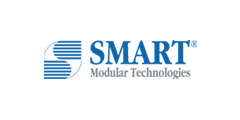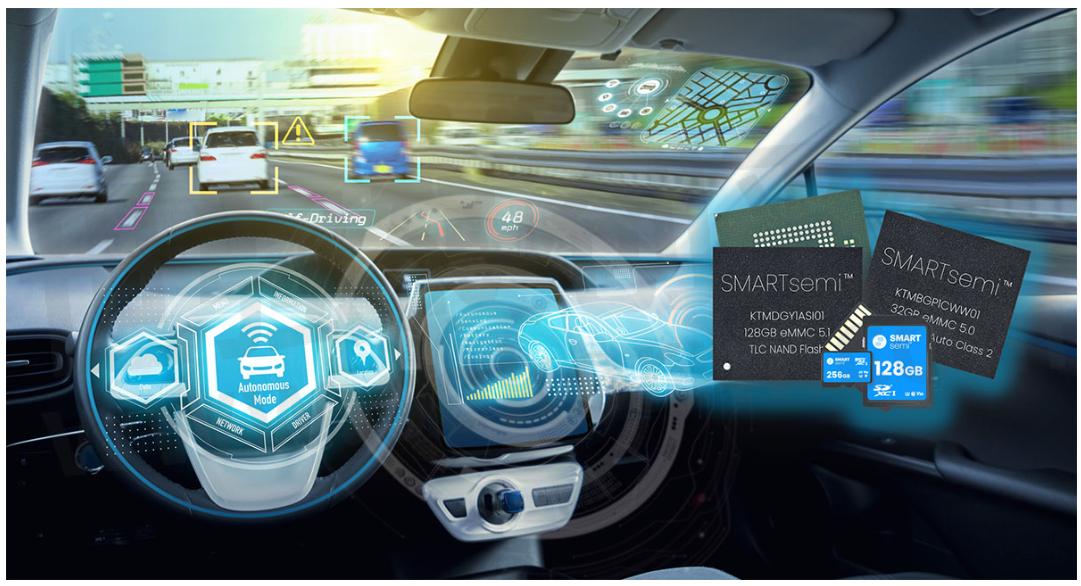Speed and Storage: The Role of Flash Memory in the Automotive Industry


Automobiles have moved beyond simply being modes of transportation with technology continuously improving the experience and safety for drivers and their surroundings. In today’s automotive industry, reliable and efficient data storage is essential for the proper functioning of vehicles. The global demand for automotive electronics was valued at approximately $275 billion in 2023 and is forecasted to grow at a CAGR of 9.1%, reaching around $420.2 billion by 2028. From navigation systems to advanced driver-assistance systems (ADAS), the demand for robust storage solutions has grown exponentially. Flash memory components help to meet these demands, ensuring the smooth operation of modern vehicles. EMMC in particular is used in various cutting-edge applications due to its smaller footprint, low power consumption, and cost-effectiveness.
The Rise of Advanced Driver-Assistance Systems (ADAS)
Today’s drivers are surrounded by technology that helps with automation, safety, and efficiency. ADAS technologies are integral to modern vehicles, providing features like collision detection, lane departure warnings, and adaptive cruise control. These systems generate and process large amounts of data in real-time, necessitating rapid data processing and storage. eMMC 5.1, with its high-speed data transfer capabilities, is a good solution for these types of applications.
As the automotive industry is progressing towards more autonomous driving, light distance and ranging systems(LiDAR systems)s are quickly becoming one of the most important components in ADAS, as the sensing technology can be used in blind-spot and pedestrian detection, as well as other cases where objects around the automobile need to be detected and mapped. LiDAR systems need robust and fast Flash storage solutions such as SSDs (Solid-State Drives) or other high-speed memory modules to make this real-time image recognition possible to help vehicles navigate their surrounding environment. eMMC’s performance and endurance are usually not sufficient for LiDAR systems.
Enhancing Navigation and Infotainment Systems
Although ADAS is rapidly gaining popularity, it’s the infotainment systems that will dominate the demand for NAND Flash storage over the next five years, accounting for 80% of the total automotive NAND storage market. Modern cars are equipped with sophisticated navigation and infotainment systems that require both: large storage capacity and fast data access. Flash memory, like eMMC 5.0 and 5.1, is ideal for these applications due to its relatively high read/write speeds and reliability. These memory solutions ensure that maps load quickly, music and video playback are seamless, and system updates can be performed efficiently.
Beyond the traditional navigation applications in individual cars, a GPS fleet management system leverages GPS technology and geolocation to monitor the activity of a fleet of vehicles. By incorporating eMMC as a storage solution, companies with vehicle or construction equipment fleets can enhance their GPS fleet management by storing geographic positioning data directly on the device. This results in efficient tracking and control of each vehicle's precise location.
Telemetry, Data Logging, and Staying Up to Date
Today's vehicles generate a wealth of data related to performance, maintenance, and driver behavior. Depending on the use case, this data can be crucial for diagnostics, predictive maintenance, and improving vehicle safety and efficiency. microSD and SD cards are often used for data logging due to their removability and ease of access. These cards allow straightforward data extraction and analysis, facilitating effective telemetry solutions.
As vehicles become more software-centric, the need for regular firmware updates increases, often pushed over-the-air (OTA). eMMC is popular for storing and executing these updates. Their ability to handle large files quickly ensures that updates are applied seamlessly, minimizing downtime and enhancing vehicle performance and security.
Scalability, Security, and Reliability Under All Circumstances
Flash memory solutions offer varying capacities, allowing them to be scaled to meet the specific needs of different automotive applications. For example, enhanced security features in eMMC 5.1 protect sensitive data, which can be crucial for applications like telematics and ADAS. The memory component classification into different automotive grades, such as AEC-Q100 Grade 0 through 3, ensures they meet stringent quality and reliability standards required for automotive environments.
All of these applications operate in varying and sometimes harsh environments. Automotive environments can have extreme temperatures, vibrations, and electrical interference. Flash memory components, like eMMC and (micro)SD cards, are designed to withstand these conditions, ensuring long-term reliability. They operate within wide temperature ranges, from -40℃ to 105℃ or even higher in some cases, depending on the application, maintaining performance and reliability in diverse environmental conditions.
The use of technology in automotive cockpits to enhance the in-vehicle experience of the passengers is growing fast. As a consequence, this trend is driving the increased demand for automotive electronics and hardware. Flash memory components, such as eMMC 5.0, eMMC 5.1, microSD, and SD cards, are integral to the functionality and advancement of modern automotive systems. Their combination of reliability, performance, scalability, and security makes them indispensable in the ever-evolving automotive landscape. As vehicles continue to advance, robust and efficient storage solutions will only become more critical, driving the industry toward greater innovation and safety.
- +1 Like
- Add to Favorites
Recommend
- Renesas RA6M4: 200 MHz Arm® Cortex®-M33 MCU with 1 MB Code Flash Memory
- Epson Starts Shipping Samples of Audio Playback LSIs with Buzzer Sound Function, Flash Memory and Built-in Oscillation Circuit
- ZETTLER Releases New 7” UART Modules ATM0700U3-CT(Capacitive touch control) and ATM0700U3-T(Resistance touch control) with 1G Bit Integrated Flash Memory
- Alliance Memory to Highlight Latest SRAM, DRAM, Flash, and Storage Memory ICs at Embedded World 2022
- Alliance Memory Highlighted Latest SRAM, DRAM, eMMC, and Flash Memory ICs at Electronica 2022
- Micron M45PE 3V Page-erasable Serial NOR Flash Available Direct from Alliance Memory
- Micron N25Q Serial NOR Flash Products Available Direct From Alliance Memory
- SMART Modular Technologies to Present at SNIA Persistent Memory + Computational Storage Summit
This document is provided by Sekorm Platform for VIP exclusive service. The copyright is owned by Sekorm. Without authorization, any medias, websites or individual are not allowed to reprint. When authorizing the reprint, the link of www.sekorm.com must be indicated.





























































































































































































































































































































































































































































































































































































































































































































































































































































































